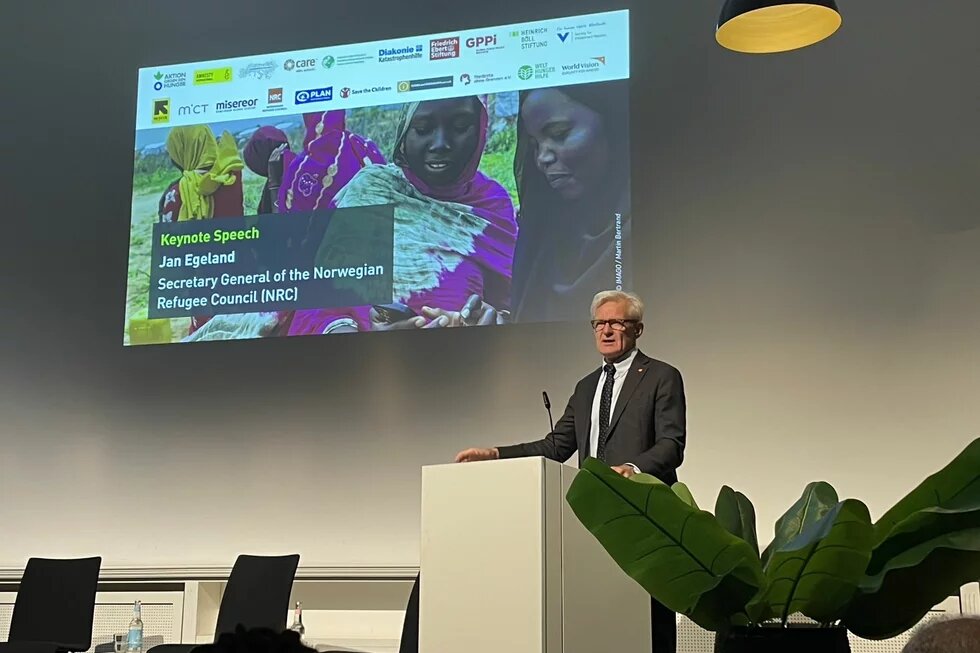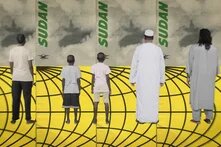In his speech, Jan Egeland, Secretary-General of the Norwegian Refugee Council (NRC), points out three key factors that are contributing to the detrimental humanitarian situation in Sudan.

The conference ‘Sudan – Thinking Peace and Humanitarian Protection from a Civilian Perspective’ took place on 18 September 2025 in Berlin, organized by a network of 20 civil society organisations and German political foundations. The following is a summary of Jan Egelands speech, condensed for clarity.
The humanitarian situation in Sudan today is catastrophic. Ten million people have had to flee their homes, 25 million rely on relief, and over 100,000 have contracted cholera as a direct consequence of the breakdown of water and sanitation infrastructure. In a different world, there would be a massive global humanitarian relief operation. Three key factors are contributing to the detrimental humanitarian situation in Sudan.
1. Humanitarian Workers in Sudan Are Underfunded and Overstretched
The world allowed a single donor to be the backbone of the humanitarian response and failed to step up and fill the gap when the US withdrew their funding. As of now, only 23 percent of the 4.2 billion US-Dollar required in 2025 to meet the most basic needs of the Sudanese people have been made available, resulting in humanitarian operations collapsing.
2. Humanitarian Actors Operating in Sudan Are Faced by Serious Access Obstacles
The warring parties regularly prevent aid actors from reaching women and children in need.
Humanitarian organisations are not motivated by political or religious considerations. They are governed by the principles of neutrality, impartiality, independence, and humanity and go where people need assistance. Yet, in Sudan, the warring parties regularly prevent aid actors from reaching women and children in need. The long-lasting sieges of Al-Fasher and Kadugli are costing lives every single day and aid is not getting in.
While aid fails those in need, the warring parties continue to receive weapons from their international backers. For them, securing guns has been easier than it has been for us to secure bread for the people.
3. Peace Diplomacy Remains Ineffective and International Attention Limited
When Sudan was in crisis twenty years ago, the situation was on the top of the global political agenda and there was a unanimous effort to drive relief and protection in Darfur. Today, there are only few positive examples, such as the initiative that helped open the Adre border crossing to Chad for humanitarian operations. But where is the effective global diplomacy to prevent arms supplies to those committing war crimes? Where is the pressure on the generals, who can declare a ceasefire, sit down and negotiate an end to the killing?
Action by those with leverage over the conflict parties, above all the Quad countries Saudi Arabia, United Arab Emirates, Egypt and the United States, is urgently needed. Their recent statement is a positive signal to which we must hold them accountable. They must work together towards a ceasefire and an end to the killing, the protection of civilians, access for humanitarian workers, and a political peace process.
The German parliament must end cuts to the humanitarian budget so that more aid can reach Sudan.
Other members of the international community can also play an important role in ending the crisis in Sudan, above all Germany, the biggest economy and most populous country in Europe. First and foremost, the German parliament must end cuts to the humanitarian budget so that more aid can reach Sudan. Germany must also expand its humanitarian diplomacy to negotiate better access to those in need in Sudan and promote the implementation of UN Security Council Resolution 2417 on hunger as a weapon of war in its candidacy for a non-permanent seat on the Security Council for 2027-2028.
Amidst the lack of international attention, the Sudanese civil society has shown incredible resilience. The solidarity of the Sudanese civilian population, especially through the Emergency Response Rooms that are providing aid across the country, stands in stark contrast to the senseless violence inflicted by the warring parties. Sudanese civil society is still there, still active and, with the support of the international community, ready to do more.

